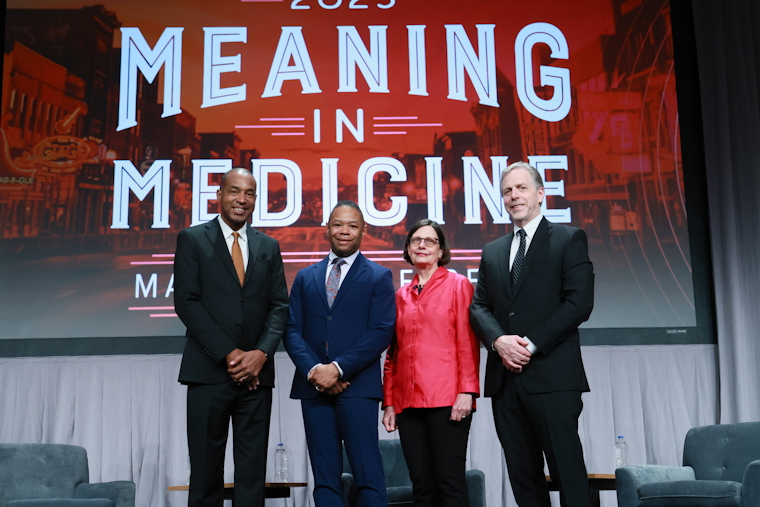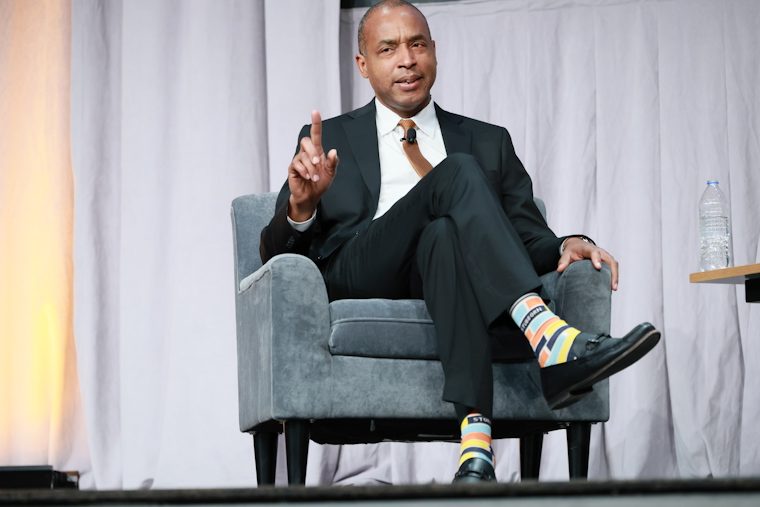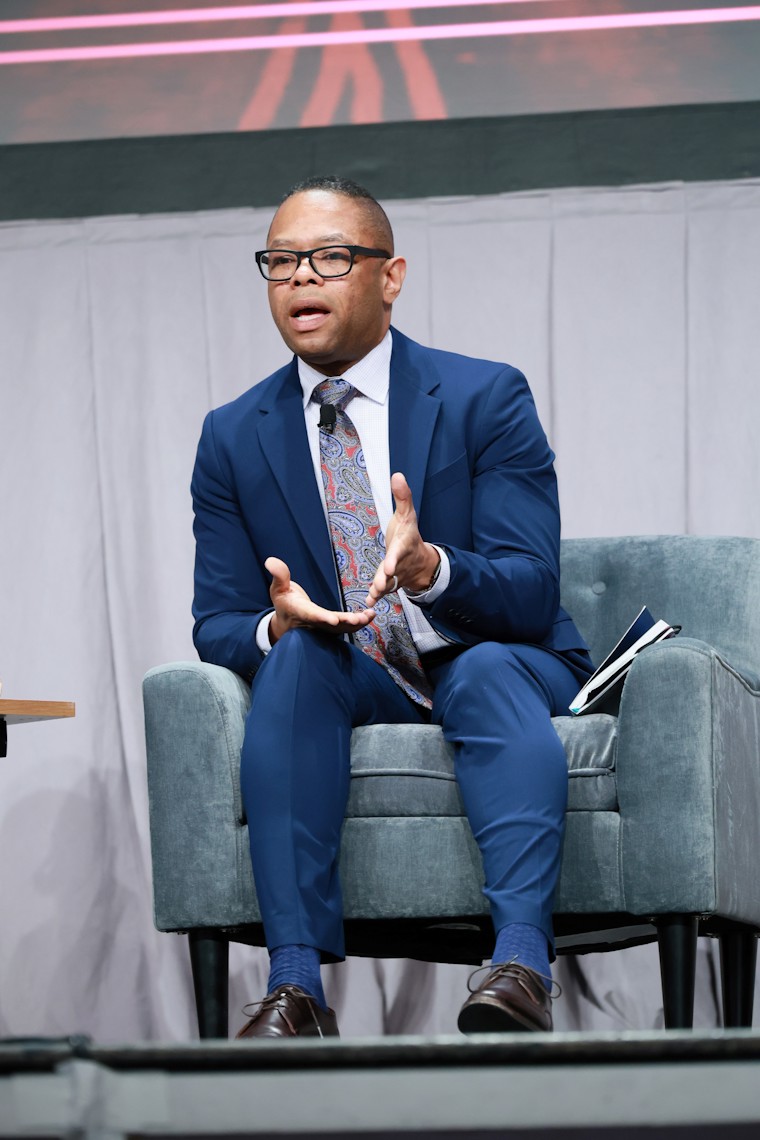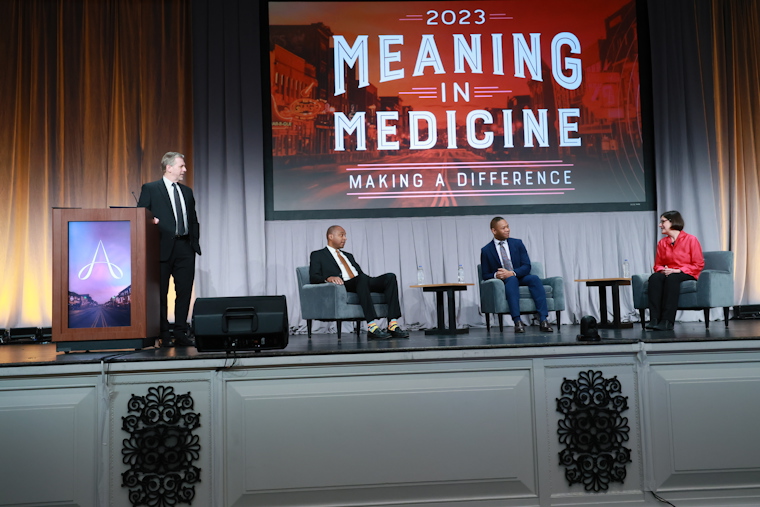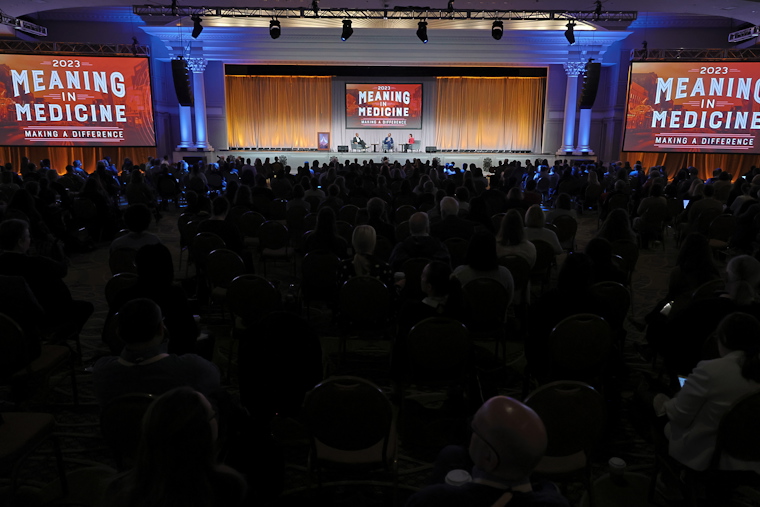“Never doubt that a small group of thoughtful, committed citizens can change the world.”
This famous Margaret Mead quote was the closing remark – and the underlying message – of a moving and powerful Marvin R. Dunn Keynote Address at the 2023 ACGME Annual Educational Conference, in which ACGME Chief Accreditation Officer Lynne M. Kirk, MD, MACP interviewed two physician leaders in the care of victims of violence.
Set up as a conversation among experts, the session entitled Healing from Trauma: Impacts on the Health Care Community touched on numerous issues related to the impact of rising violence on health and health care in the United States.
Theodore (Ted) J. Corbin, MD, MPP is professor and chairperson for the Department of Emergency Medicine at Rush University Medical Center in Chicago, Illinois. His research focuses broadly on addressing the trauma in the lives of survivors of violence, especially boys and men of color for whom violence is a leading cause of disability and death. Originally from Philadelphia, Pennsylvania, Dr. Corbin spoke of how violence has had a steady influence on his life since childhood, as his family left Philadelphia for the suburbs to get away from growing violence in his neighborhood in the western part of the city.
Selwyn Rogers Jr., MD, MPH, FACS is section chief of Trauma and Acute Care Surgery at the University of Chicago Medicine. Beyond trauma and surgical critical care, Dr. Rogers has been an advocate for treating intentional violence as a public health problem. In partnership with the Center for Community Health and Health Equity at Brigham and Women’s Hospital in Boston, Massachusetts, he developed a violence intervention and prevention program to address the social factors that put patients at increased risk for trauma and mortality, such as poverty, hopelessness, and lack of opportunity. While he described his youth as starkly different from the work that drives him today, Dr. Rogers said that caring for patients with repeated gun injuries early in his surgical career developed his sense of mission and purpose as a physician and physician advocate.
Dr. Kirk introduced the session by articulating the overwhelming number of deaths by guns in the United States in recent years. In 2020, 79 percent of homicides and 53 percent of suicides involved guns, she said, noting these represent the highest numbers of gun-related deaths in the US in more than 20 years. These numbers were followed by a video, shared with permission from Dr. Corbin and one of his patients, Dave Green. A young Black man, Mr. Green speaks of his personal experience with gun violence, starting with the first time he saw someone shot – on a basketball court in a park in his neighborhood when he was 12 – and then about the continued presence of gun violence in his life, including being shot himself three times. He talks about the traumatic impact gun violence has had, turning him from an innocent boy who never imagined such a reality, to a man struggling with feelings of revenge.
Drs. Corbin and Rogers then discussed how exposure to such violence affects patients, their families, and their communities; how they manage the effects of treating trauma victims on their own well-being; what physician educators should know to both teach and support their learners with regard to experiencing repeated exposure to trauma; and what the ACGME and other organizations in the medical education continuum can do to make a difference.
As Black men, both speakers spoke passionately and personally about the disproportionate impact of violence on Black and Brown communities.
Dr. Rogers, a father to three sons ages 27, 24, and 20, spoke emotionally about seeing his own children in his patients on the Southside of Chicago.
“They’re my boys. They’re my sons,” he said. “I am saddened, not just by the shooting of a 15-year-old who should be thinking about other stuff, but when that 15-year-old is lying on a gurney, I’m looking at this skinny, small boy – I see my son.” Balancing that personal connection and emotion with the role of a physician, Dr. Rogers told the audience that, “I lean into my patients. That’s what we teach our learners. That’s how we maintain the humanity.”
Still, Dr. Rogers acknowledged, there are moments when the patients he sees in a day come home with him at night, when maintaining that sense of humanity over the feeling of hopelessness becomes especially difficult, and it becomes hard to reenergize to do it again.
Dr. Corbin echoed his co-presenter’s sentiments. “It’s hard to see patients of trauma who look like family,” he admitted. But he also spoke of the need to “reenergize” as Dr. Rogers said, to do it again.
“It is so important to find joy – however, whatever that is – outside of your day to day, so that you can come back as your authentic self to provide complete care to your patients,” he said.
Dr. Corbin stressed the need to destigmatize therapy and spoke about how incorporating regular therapy into his life “made a world of a difference.” He urged the audience to refer their colleagues, faculty members, and learners to it.
Asked what educators of physicians should know about the subject of violence and its impact, both speakers emphasized the criticality of understanding trauma-informed care.
“Knowing and understanding it and how to deliver it is extremely important,” said Dr. Corbin, noting that this education must happen across the medical education continuum, not just in trauma medicine or graduate medical education.
“We really need to think more holistically about how to educate our learners,” said Dr. Rogers, adding that while “we do great in the biomedical model, we do a poor job thinking about the things that actually matter to people in the communities in which they live.” People’s – patients’ – everyday lived experiences, he said, matter and significantly affect how they interact with physicians and health care. He stressed that this must be incorporated into the health education paradigm.
“We have to find ways of having people have fluid conversations about people’s real circumstances, or we can’t reach them,” he said, punctuating that with a stark reminder: “Public health is a factor in physical health.”
Both men also spoke emphatically about the role of the physician as advocate, noting that physicians, physician educators, and physician researchers have a unique opportunity to play a key role. Dr. Corbin underscored the need to advocate for reimbursement for wraparound services “to help our communities heal, grow, and thrive,” and Dr. Rogers stressed there is no one way to advocate. “We can all do something,” he said, encouraging the audience to identify their strengths and leverage those to affect change.
Drs. Corbin and Rogers also spoke about the role of organizations like the ACGME in effecting meaningful change, stating that working in isolation is ineffective, and that organizations with the power of influence must work together.
“We are in the business of relief of suffering,” said Dr. Rogers. “We can align to help relieve more suffering.”
Following a brief Q and A with the audience, Dr. Kirk asked the speakers for their final thoughts.
“We’re all here for a reason [and] that is to see things change,” Dr. Corbin told the audience, encouraging them to seek out and connect with the organizations and institutions developing resources for violence prevention and education, to support them and participate in the work.
Dr. Rogers’ sentiments were similar. “There are some organizations that are really trying to advance this work, and developing standards about what violence intervention work can and should look like,” he said.
“Violence seems like a big thing. It is. And it’s impacting our lives. But we can also have an impact,” said Dr. Corbin, turning to hope. “We have so much voice in the change that can happen around this issue that continues to plague us. We have the capacity to make the change.”
Visit Learn at ACGME to watch the Marvin R. Dunn Keynote Address and other featured sessions from the 2023 Annual Educational Conference.

